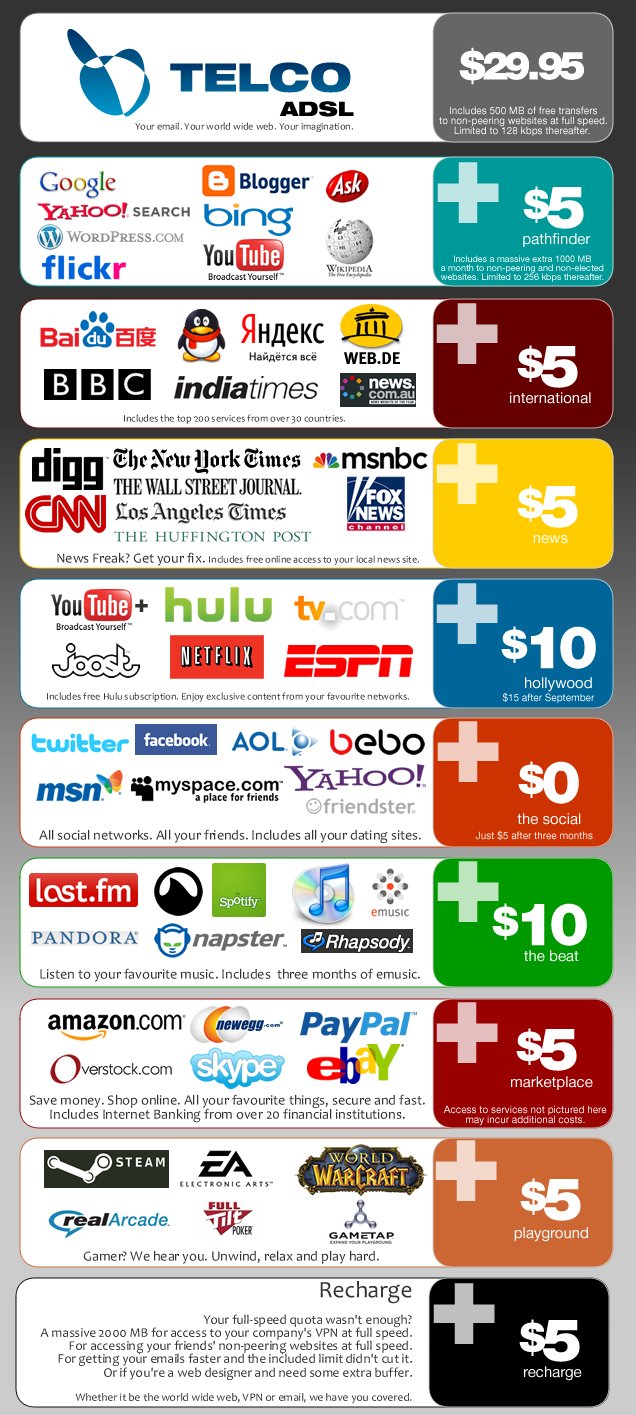The FCC chairman has come out in support of Network Neutrality and it looks like they will start enforcing a modified Title II very soon: www.wired.com/2015/02/fcc-chairman-wheeler-net-neutrality. I think it’s good that the FCC is finally thinking about consumers, but I do have some concerns that the proposals don’t address the heart of the issue and can do us a different kind of harm.
I believe that nature of our problem is not due to the lack of rules governing how the ISPs must operate, but rather the lack of enforcement of existing laws. Specifically anti-trust laws.
Do you trust your media provider?
We’re currently buying our Internet connectivity from media cartels. These are companies that own the media, the distribution rights to the media, and the distribution pipelines for the media. Their remarkable vertical integration encourages anti-consumer behavior at every touch point with the consumer.
Their vertical integration allows them to leverage one of their market offerings into another one. For example, say you wanted to rent “The Lego Movie” and stream it on your TV. If you’re a digital consumer, you probably have several ways to rent it besides driving to Blockbuster or waiting on a disc to ship. You could stream it from your TV provider’s (Comcast, Time Warner, etc.) on demand service or from one of the myriad digital-only services available (Netflix, Amazon, etc.).
What differentiates these services? They’re providing the exact same product. There’s only two things they can do: provide a product that works and provide good customer service. They’re on level playing field with the customer service part, but the ISPs have a significant advantage on the working part.
The digital-only services have to depend on their competitors to deliver their product.
Netflix directly competes with Comcast to sell a digital video, but depends on Comcast’s infrastructure to actually deliver it. That’s kind of insane when you think about it. What would it be like if you wanted to buy a toaster, but Walmart had a government-enforced monopoly on physical retail in your town? Sure, Walmart could be mandated to host secondary retailers like Target or K-Mart, but why would they do anything to make that experience pleasant? It would be in Walmart’s best interest to degrade secondary shopping experiences as much as possible.
They wouldn’t even have to actively make it difficult for Target and K-Mart to operate, they just need to neglect the areas where they do. Lights are burned out or flickering? Don’t change them. Area getting dirty? Why spend money to clean our competitor’s areas? Rest of the store getting a facelift? No need to upgrade our competitors for them.
As a matter of fact, from a shareholder point of view, it would be irresponsible for Walmart to spend anything on maintaining a competitor’s product and distribution system.
This brings us back to the Netflix and Comcast example. Last year, people were accusing Comcastaccusing Comcast of intentionally degrading or neglecting their interconnection with Netflix . That’s only partly true. They were neglecting it only in the sense that they weren’t upgrading the connection points to eliminate congestion during prime streaming times. Why should they spend money to help a competitor have better service?
Network neutrality doesn’t address the actual interconnection problem.
If network neutrality were enforced as the FCC has proposed, it wouldn’t do anything to fix one of the big issues that spurred this push. Comcast could be mandated to treat every packet as equal in their routing systems, but the government can’t dictate how it architects its network or where it spends money. They can’t force them to buy $10 million in new routers at a big Amazon interconnection. And as a private company, they must always spend the money where it benefits them most. And it benefits them the most when their own $5.99 HD copy of the Lego Movie streams more reliably than Amazon’s.
That’s the core of the problem. ISPs are not in the business of providing an Internet data service to their customers. They are media trusts in the business of monopolizing access to media consumers to extract as much revenue as possible and stifle any and all competition and innovation.
Two choices: get media companies out of the ISP business or eliminate local monopolies.
I see 2 ways to address this 1) Break up the media/ISP trusts. You can’t provide data services if you also provide data. This will make sure the companies providing data connections are in the business of making money by selling functional and working data connections.
Or 2) Eliminate local monopolies. If there were healthy local markets for ISPs, this would be a non-issue. An ISP wouldn’t be able to get away with crippling portions of the Internet for their customers because their competitors would call them on it and take their customers.
Net neutrality is still important.
It’s just not really a problem, yet. It’s been pretty much agreed even among the ISPs (excepting Verizon perhaps), that this isn’t what we want to see:
But it’s this idea that we’re trying to protect against right now. The real threat is more insidious and much more profitable.

